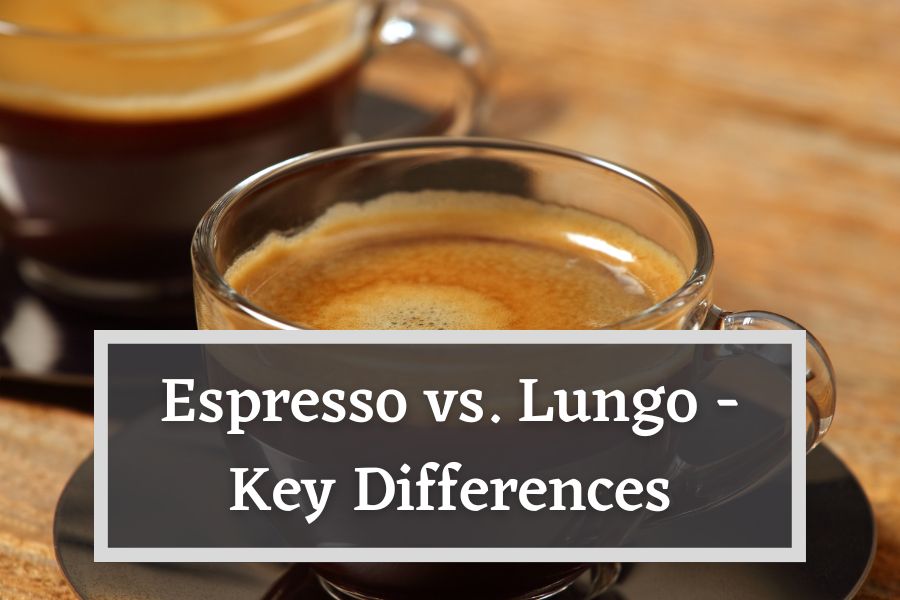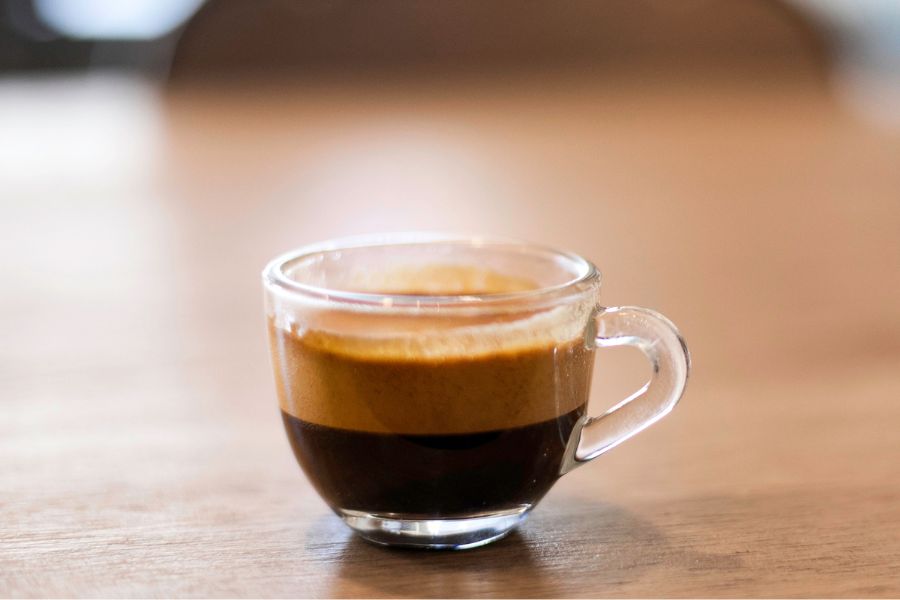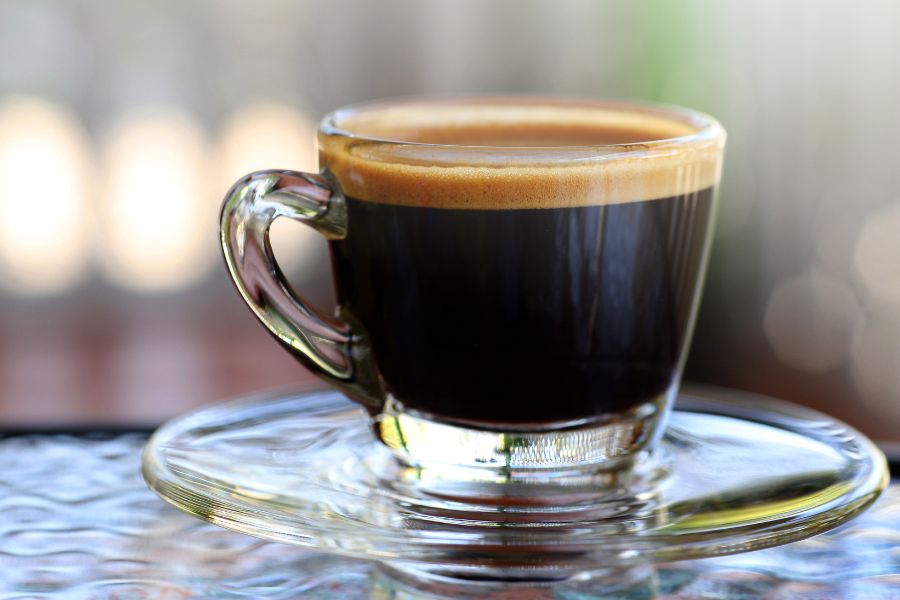Espresso and lungo are two popular coffee brewing methods that differentiate in terms of their brewing time and water quantity.
Espresso is a short, concentrated shot of coffee that is brewed with a small amount of water, usually 30 millilitres (1oz) or less. On the other hand, lungo is a longer shot of espresso that requires a more extended brewing time with a higher quantity of water (cca 50ml – 2oz), resulting in a milder, diluted coffee beverage.
So espresso vs. lungo? Don’t worry, I’ve got all of the facts to help make the decision easier. So sit back and relax and read on!

Espresso Basics
Espresso is a strong and concentrated coffee beverage. It originated in Italy, where it was first created in the early 20th century.
Espresso is made by forcing hot water through finely-ground coffee beans under high pressure, resulting in a rich and bold flavor that is unique to this drink.
The process of making espresso is a delicate one and requires a high level of skill to produce the optimal shot. The beans used must be specifically roasted for espresso and must be ground to a fine consistency to ensure proper extraction.
The extraction process itself is a short one, lasting only about 25-30 seconds, during which time the water is typically heated to around 200 degrees Fahrenheit.

There are also many variations of espresso drinks, including cappuccinos, lattes, macchiatos, and Americanos, all of which add different amounts of milk or water to the basic shot of espresso.
The popularity and versatility of these drinks have made espresso machines a common sight in cafes, restaurants, and homes around the world.
Beyond its delicious taste, espresso also has several health benefits. Studies have shown that moderate coffee consumption, including espresso, can improve cognitive function, boost energy levels, and even reduce the risk of certain diseases.
Lungo Basics
Lungo is a type of espresso made with more water and a longer extraction time than traditional espresso or ristretto. It is often referred to as an “elongated” or “long” shot.
The larger amount of water used to brew lungo creates a milder, less concentrated flavour than a regular espresso shot.
Lungo is believed to have originated in Italy and is popular in European countries such as France, Switzerland, and Austria. It is served in a larger cup or glass than traditional espresso and is often compared to Americano coffee.

Despite its popularity, lungo has a few downsides. The longer extraction time can result in a bitter taste if not properly timed, and it requires a higher quantity of coffee grounds than a regular espresso shot.
Moreover, due to its milder taste, some coffee connoisseurs argue that it lacks the boldness and complexity of a traditional espresso shot.
Despite these downsides, in recent years, lungo has become a popular option in coffee shops and cafes and is often used as a base for speciality drinks such as lattes and cappuccinos.
It offers a versatile and more approachable option for those who enjoy the taste of espresso but prefer a milder flavour profile.
Espresso vs. Lungo – Key Differences
Overall, espresso and lungo are two similar yet contrasting coffee brewing methods that have significant differences in extraction time, water quantity, and flavour profile.
Espresso offers a stronger, more concentrated coffee flavour ideal for coffee lovers who prefer an intense and bold taste. On the other hand, lungo provides a milder, less intense taste that is more suitable for those who prefer a less concentrated coffee beverage.
Some of the key differences between Espresso and Lungo include:
| Espresso | Lungo | |
| Water content | 1oz (30ml) | 2oz (50ml) |
| Taste | Blod/rich/bitter | Mild/less intense |
| Caffeine content | 68mg | 94mg |
| Crema | Thick | Thin |
| Serving size | 1-2oz cup | 3-4oz cup |
- Water content – Espresso contains about 1oz (30ml) or less of water. Lungo, on the other hand, is made with a larger amount of water, resulting in a longer, milder shot of coffee (2oz/50ml).
- Taste – Espresso is known for its strong, bold flavour and intense aroma, while Lungo has a milder flavour and less pronounced aroma due to the increased amount of water used in its preparation.
- Caffeine Content – Because Espresso is so concentrated, it typically contains more caffeine per ounce than Lungo. However, because Lungo is brewed for a longer period of time, it may contain more overall caffeine than a single shot of Espresso.
- Crema – Espresso is known for its thick, creamy layer of “crema” (the tan foam that forms on top of the shot when it’s properly brewed), while Lungo typically has a thinner layer of crema.
- Serving Size – Espresso shots are typically just 1-2 ounces in size and are often consumed in a single gulp, while Lungo shots are usually 3-4 ounces and are meant to be sipped slowly.
Conclusion
In the end, espresso vs. lungo comes down to water content, taste, and intensity. And while espresso may have a more intense flavour as well as a higher caffeine content, lungo offers a milder and smoother beverage experience.
Which one should you go with? Well, whether you opt for an espresso or a lungo depends on what type of flavour profile suits your palate better.
I suggest that you try both drinks out for yourself and determine which one suits you and your taste buds better. Either way, you go, I’m sure of one thing… You can’t go wrong!
Interested in learning more? Find out the difference between espresso and ristretto.
FAQs
Is lungo stronger than espresso?
Lungo and espresso coffee differ in strength, not solely based on caffeine. Lungo has slightly more caffeine but is not necessarily stronger. Factors like bean type, roasting, and brewing affect taste, aroma, and overall intensity.
Is lungo just two shots of espresso?
No, a lungo is not simply two shots of espresso. While both are made with the same amount of ground coffee, a lungo uses more water, resulting in a longer extraction time and a milder, less concentrated flavour profile compared to standard espresso.
How are espresso and lungo typically served?
Espresso is typically served in small espresso cups and is often consumed quickly as a ‘shot’ of coffee. Lungo, on the other hand, is served in larger cups and can be consumed more slowly.
Can espresso be used to make a lungo?
Yes, it is possible to make a lungo using espresso. This is achieved by adding more water to the shot of espresso, but care must be taken not to dilute the flavour too much.
